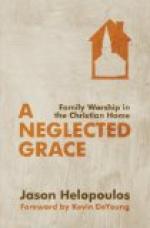Thus, therefore, we see that the relation between the Christian home and the church is one of mutual dependence. The latter, as the highest form of religious association, demands the former, and the former looks to the latter as its completion. Where the religion of the family does not move in the element of the church, it is at best but sentimentalism on the one hand, and rationalism on the other. It is a spurious pietism. To be genuine it must be moulded by the church. Without this it is destitute of sterling principle, of a living-faith, of well-directed effort and lofty aims. The family which does not move in the element of the church is a perversion of the true purpose of God in its institution. It will afford no legitimate development of Christian doctrine, and the whole scheme of its religion will rest for its execution upon unreliable agencies extraneous to home itself. Hence we find that the piety of those families or individuals that isolate themselves from the church, is at best but ephemeral in its existence, contracted in spirit, moving and operating by mere impulse and irregular starts, and withal destitute of vitality and saving influence. A death-bed scene may awaken a transient and visionary sense of duty; adversity may startle the drowsy ear, and cause the parents to turn for the time to the souls of their children; but these continue only while the tear and the wound are fresh, and the apprehensions of the eternal world are moving in their terrible visions before them!
The efficacy of the Christian home, therefore, depends upon its true relation to the church. The members should be conscious of this. Then both parents and children Will appreciate the religious ministrations of home. Then the former will not grow weary in well doing, but will have something to rest upon, something to look to; and the latter will love the church of their fathers, and venerate the family as its nursery.




